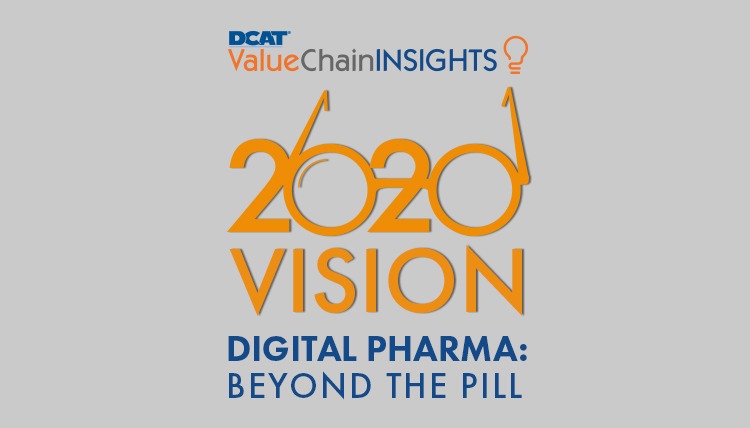2020 Vision: Digital Pharma—Beyond the Pill
Digitalization is playing an increasingly important role in drug-development and commercialization, but how about in new products themselves? Are digital medicines the wave of the future or an interesting, but far-reaching possibility?
Digital medicines and digital health
The field of digital medicines is a new one and is part of the larger field of digital health, itself a field that is emerging. Broadly speaking, the US Food and Drug Administration (FDA) defines the scope of digital health to include categories such as mobile health (mHealth), health information technology (IT), wearable devices, telehealth and telemedicine, and personalized medicine. These technologies provide new options for facilitating prevention, early diagnosis of diseases, and management of chronic conditions outside of traditional care settings. Digital health ranges in use from mobile medical apps and software that support clinical decisions by doctors to artificial intelligence and machine learning.
The FDA’s Health Innovation Action Plan outlines the agency’s efforts to reimagine the FDA’s approach to digital health products and includes several key goals: issuing guidance to modernize the FDA’s policies; increasing the number and expertise of digital health staff at the FDA; and developing a Digital Health Software Precertification Pilot Program. The FDA’s Center for Devices and Radiological Health has established a Digital Health program, which seeks to provide continued regulatory clarity by: fostering collaborations and enhancing outreach to digital health customers and developing and implementing regulatory strategies and policies for digital health technologies. The following are topics in the digital health field identified by the FDA on which the FDA has been working to provide clarity: artificial intelligence and machine learning in software as a medical device; cybersecurity; device software functions, including mobile medical applications; health IT; medical-device data systems; medical-device interoperability; software as a medical device; telemedicine; and wireless medical devices.
Digital health and digital medicines: a market view
The field of digital health, including digital medicines, consist of a variety of players, including start-ups, established medical-device and technology companies, and healthcare companies, including pharmaceutical companies. Market definitions and market sizes, therefore, vary depending on how the market is defined as do the numbers for financing into digital health companies. CB Insights, an investment firm in digital health, estimates that in 2019 in the US, investments in digital healthcare start-ups reached a record of more than $11 billion, a 16% increase year-over-year. Rock Health, a venture capital fund dedicated to digital health, estimates that digital health venture funding had its strongest start ever in 2020, with $3.1 billion invested in the first quarter of 2020 following a moderation in investment between 2018 and 2019. The $3.1 billion raised in the first quarter of 2020 was seen across 107 deals—more than 1.5 times the total funding in the first quarter of any previous year and 57% greater than the average quarterly funding across 2018-2019, which made for the largest ever 12-month funding period for digital health, with $9.3 billion invested across the second quarter of 2019 to the first quarter of 2020, according to information from Rock Health.
Pharma industry and digital health and digital medicines
For the pharma industry, digital health has certainly become an area of investment and partnerships, which show varied results thus far. Perhaps the most prominent example of a digital medicine or so-called “smart pill” was created by Otsuka Pharmaceutical and Proteus Digital Health, a Redwood City, California-based company, for a drug-device combination product of Abilify (aripiprazole), a drug to treat schizophrenia and mixed episodes in bipolar disorder, and as an adjunctive therapy for the treatment of major depressive disorders with an ingestible sensor, developed by Proteus, imbedded in the pill. In 2017, the FDA approved Otsuka’s and Proteus’ Abilify MyCite (aripiprazole tablets with a sensor), a drug-device combination product comprised of Otsuka’s oral aripiprazole tablets embedded with Proteus’ digital ingestion tracking system, for treating schizophrenia, bipolar disorder, and depression. The sensor technology and patch are made by Proteus Digital Health. Abilify, as a tablet without the tracking system, was approved by the FDA in 2002 to treat schizophrenia. The ingestible sensor used in Abilify MyCite was permitted for marketing by the FDA in 2012.
Abilify MyCite works through an ingestible sensor embedded in the pill that records the amount of the medication that was taken. The system works by sending a message from the pill’s sensor to a wearable patch. The patch transmits the information to a mobile application so that patients can track the ingestion of the medication on their smart phones and provide information to a physician on medication use.
Reflective, however, of the uncertainty of participating in an emerging market sector, Proteus earlier this month (June 2020) filed for bankruptcy under Chapter 11 proceedings in the US. In late 2018, Proteus and Otsuka formed an $88-million partnership for digital medicines, but the companies terminated that agreement earlier this year (2020).
Still other digital deals are progressing. In 2019, Otsuka Pharmaceutical and Click Therapeutics, a New York-based developer of software as prescription medical treatments, formed a collaboration agreement, worth up to $302 million, to develop and commercialize a prescription digital therapeutic for treating major depressive disorders. The collaboration combines Click’s ability to discover and validate a software application and deploy it commercially with Otsuka’s expertise in developing and commercializing pharmaceuticals for treating mental illness.
Another pull-back in digital medicines occurred when Novartis’ generics business, Sandoz, announced in October 2019 that it would end a partnership to commercialize Pear Therapeutics’ digital therapeutics for substance abuse. In 2018, Sandoz, partnered with Pear Therapeutics, a Boston, Massachusetts-based prescription digital therapeutics company, to commercialize Pear Therapeutics’ two lead products, reSET and reSET-O, FDA-approved digital therapeutics for treating substance abuse. On a positive note for Pear Therapeutics, earlier this year (2020), the cmpany received FDA approval for Somryst, a prescription digital therapeutic for treating insomnia.
Also, in late 2019, Sanofi announced it was restructuring its role in Onduo, its diabetes-management joint venture with Verily (the life science research arm of Alphabet Inc, the parent company of Google) that the two companies had earlier formed with $500 million to start in 2016. Sanofi said it would be restructuring its role in the project, but would stay on as a financial investor.
One interesting development for new prescription digital health models occurred earlier this month (June 2020) when Akili, a Boston-based company developing video game-based digital medicines, received US and European regulatory authority for EndeavorRx as a prescription treatment for children with attention-deficit/hyperactivity disorder (ADHD). Delivered through a video-game experience, EndeavorRx is indicated to improve attention function as measured by computer-based testing in children ages 8-12 years old with primarily inattentive or combined-type ADHD, who have a demonstrated attention issue.
Overall, digital tools continue to be an important part of partnerships by pharma companies if not directly into “smart pills” but in drug development and commercialization. Novartis, in particular, has made digitalization an important part of its overall strategy. In October 2019, Novartis selected Microsoft as its strategic artificial intelligence (AI) and data-science partner for bolstering Novartis AI capabilities from research through commercialization for the discovery and development of medicines. Microsoft and Novartis will also collaborate to develop and apply AI platforms and processes that support future programs across these two focus areas. The overall investment will include project funding, subject-matter experts, technology, and tools.
In 2019, Sanofi and Novo Nordisk formed separate partnering deals for insulin delivery. Sanofi and Abbott are partnering to integrate glucose-sensing and insulin-delivery technologies. Sanofi and Abbott say they will develop tools that combine Abbott’s FreeStyle Libre mobile technology, a sensor-based glucose monitoring system that can be worn by the patient, with insulin-dosing information for future smart pens, insulin titration apps, and cloud software. Novo Nordisk and Medtronic are collaborating to integrate insulin-dosing data from smart insulin pens to monitor glucose events. In 2018, Roche formed a strategic, long-term partnership with GE Healthcare to jointly develop and co-market digital clinical-decision support software. The partnership is initially focusing on products designed to accelerate and improve individualized treatment options for cancer and critical care patients.






